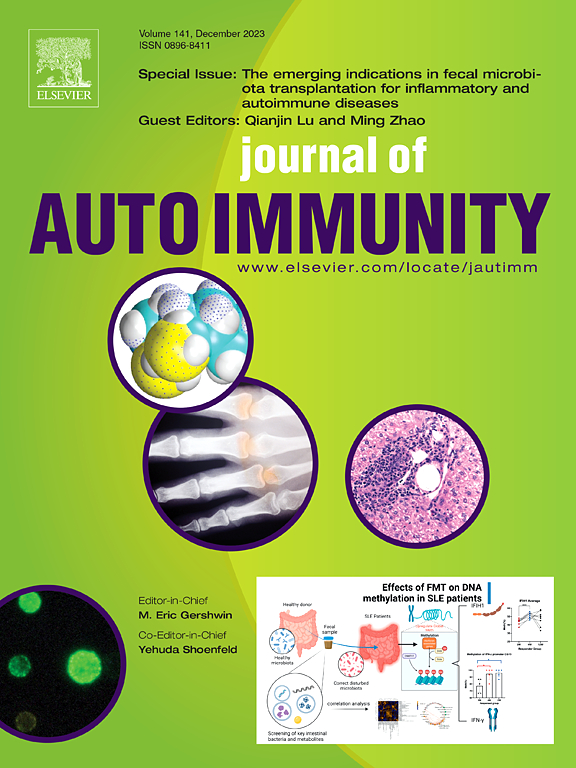The role of age-associated B cells in systemic lupus erythematosus
IF 7
1区 医学
Q1 IMMUNOLOGY
引用次数: 0
Abstract
Age-associated B cells (ABCs) are a distinct subset of B cells. This B-cell population expands in the elderly but is also abnormally expanded in patients with autoimmune diseases like systemic lupus erythematosus (SLE). ABC differentiation requires unique signaling stimuli, including BCR stimulation, TLR7 and TLR9 signaling, and the action of cytokines. The role of ABCs in the pathogenesis and treatment strategies of SLE has been a research hotspot in recent years. Possible pathogenic mechanisms include the production of autoantibodies and cytokines, as well as stimulation of spontaneous germinal center. Specifically targeting ABCs is a promising strategy for treating SLE. This article reviews the role of ABCs in SLE. Understanding the origin and differentiation of ABCs and their role in SLE will facilitate the discovery of novel drug targets for the treatment of SLE.
年龄相关B细胞在系统性红斑狼疮中的作用
年龄相关B细胞(abc)是B细胞的一个独特的亚群。这种b细胞群在老年人中扩大,但在系统性红斑狼疮(SLE)等自身免疫性疾病患者中也异常扩大。ABC分化需要独特的信号刺激,包括BCR刺激、TLR7和TLR9信号以及细胞因子的作用。abc在SLE发病机制和治疗策略中的作用是近年来的研究热点。可能的致病机制包括自身抗体和细胞因子的产生,以及自发生发中心的刺激。特异性靶向abc是治疗SLE的一种有前景的策略。本文综述了abc在SLE中的作用。了解abc的起源和分化及其在SLE中的作用,将有助于发现治疗SLE的新药物靶点。
本文章由计算机程序翻译,如有差异,请以英文原文为准。
求助全文
约1分钟内获得全文
求助全文
来源期刊

Journal of autoimmunity
医学-免疫学
CiteScore
27.90
自引率
1.60%
发文量
117
审稿时长
17 days
期刊介绍:
The Journal of Autoimmunity serves as the primary publication for research on various facets of autoimmunity. These include topics such as the mechanism of self-recognition, regulation of autoimmune responses, experimental autoimmune diseases, diagnostic tests for autoantibodies, as well as the epidemiology, pathophysiology, and treatment of autoimmune diseases. While the journal covers a wide range of subjects, it emphasizes papers exploring the genetic, molecular biology, and cellular aspects of the field.
The Journal of Translational Autoimmunity, on the other hand, is a subsidiary journal of the Journal of Autoimmunity. It focuses specifically on translating scientific discoveries in autoimmunity into clinical applications and practical solutions. By highlighting research that bridges the gap between basic science and clinical practice, the Journal of Translational Autoimmunity aims to advance the understanding and treatment of autoimmune diseases.
 求助内容:
求助内容: 应助结果提醒方式:
应助结果提醒方式:


